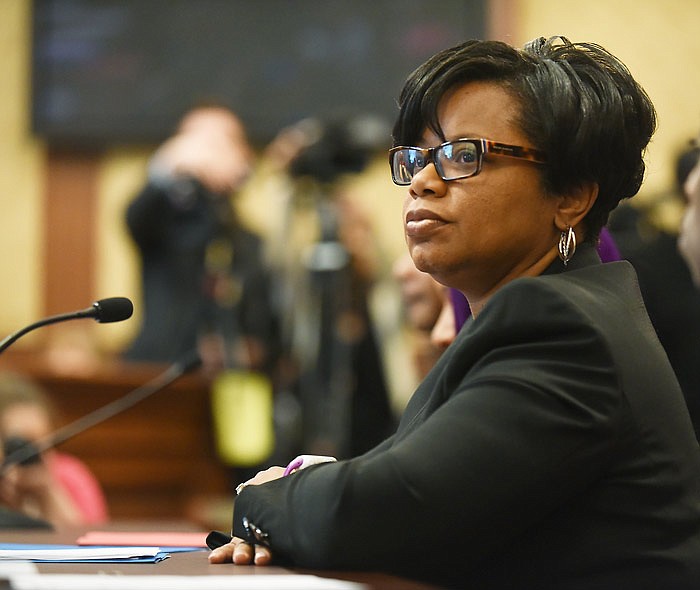A Missouri senator offered the assurance Monday that her proposal to allow some felons on probation or parole to vote would not apply to people convicted of dangerous felonies.
The senator's proposal would, however, still apply to people convicted of even particularly egregious non-violent felonies, such as white collar crimes involving large amounts of stolen money.
Sen. Jamilah Nasheed, D-St. Louis, announced two weeks ago that she and a House colleague had filed legislation to undo the prohibition on voting for people on probation or parole after a felony conviction, unless someone had been convicted of a felony or misdemeanor related to voting.
Under current state law, only convicted felons who have completed their sentence and probation or parole are eligible to vote, unless they've been convicted of an election-related felony or misdemeanor, according to the Missouri Secretary of State's Office.
Nasheed said Monday, given the length of many parole or probation sentences, that can still disenfranchise someone from a number of elections in their lifetime.
She and state Rep. Rasheen Aldridge, D-St. Louis, who is sponsoring the companion House bill, previously said the current law leaves 60,000 Missourians out of the political process.
Nasheed also has filed a joint resolution, SJR 61, that would accomplish the same thing as her bill, but would ask for Missouri voters' approval first.
Nasheed clarified Monday at a hearing before the Senate's Judiciary and Civil and Criminal Jurisprudence Committee that she had substitutes for her bill and a parallel joint resolution that would not extend voting rights to people convicted of a violent felony who are on probation or parole.
Committee Chairman Sen. Tony Luetkemeyer, R-Parkville, wanted to check to make sure first-degree murder and some sexual offenses against children that may not fall into the definition of "dangerous felony" would still be excluded from having voting rights extended to people convicted of those crimes.
State law makes a distinction between first-degree murder and other dangerous felonies. A "dangerous felony" includes second-degree murder, as well as various other crimes - arson, assault, rape, attempted rape, sodomy, kidnapping, domestic assault, elder abuse and assault of a law enforcement officer, among others - if in the first-degree.
Beyond technicalities, Nasheed also defended the merits of her bill.
She agreed with a hypothetical from committee Vice Chairman Sen. Bob Onder, R-Lake St. Louis, that a white collar criminal found guilty of embezzlement of a lot of money and on probation or parole would still get to vote under her proposal.
Onder also questioned whether someone who has not completed their probation or parole has actually completed their sentence.
In other words, under current law, voting rights could be considered a reward deserved only for completing one's sentence.
Nasheed said that's not good law. She opened her testimony by saying the heart of her bill is "taxation without representation" - people who've served their time incarcerated, pay their taxes, but yet are still not allowed to fully participate in public life.
Supporters who testified in favor of her legislation included representatives of the Urban League of St. Louis and its Save Our Sons program - a partnership with the Department of Corrections - EX-Incarcerated People Organizing, the Missouri Catholic Conference, Missouri NAACP, the ACLU of Missouri and Empower Missouri.
There was no testimony in opposition to the bill.
Most of the committee hearing Monday afternoon focused on a House bill from Rep. Holly Rehder, R-Sikeston, that would establish a Department of Health and Senior Services prescription drug monitoring program, or PDMP, for schedule II, III and IV controlled substances.
The intent of that proposal is to help to curb opioid addictions by raising red flags for physicians to prevent people from becoming addicted in the first place, at least by the means of opioid pills prescribed in that patient's name.
Opponents questioned the efficacy of PDMPs - Missouri is the last state in the country to approve one - alleged personal privacy implications and were worried about limiting access to opioids for people in chronic pain.
Supporters of the bill included associations for Missouri physicians and pharmacies, as well as Jim Marshall - a former Jefferson City High School coach and teacher who publicly educates about addiction, especially at schools, after his son, Cody, died of a heroin overdose.

